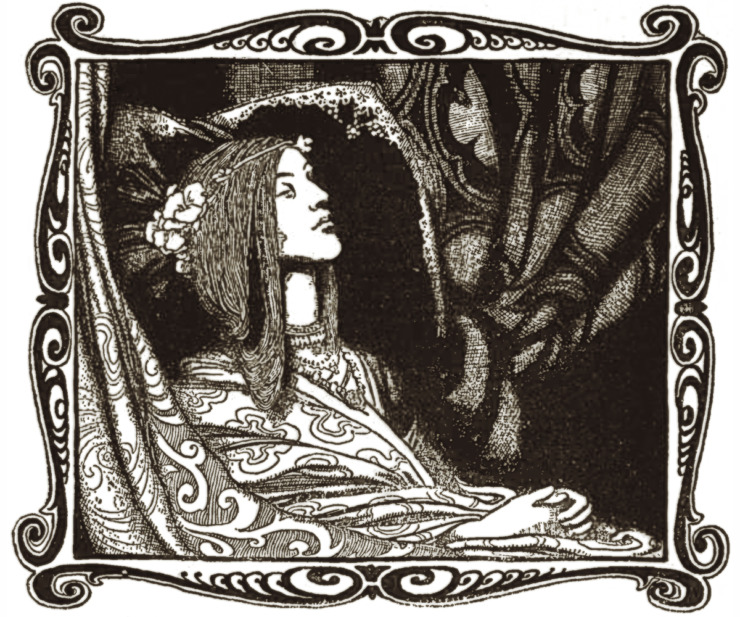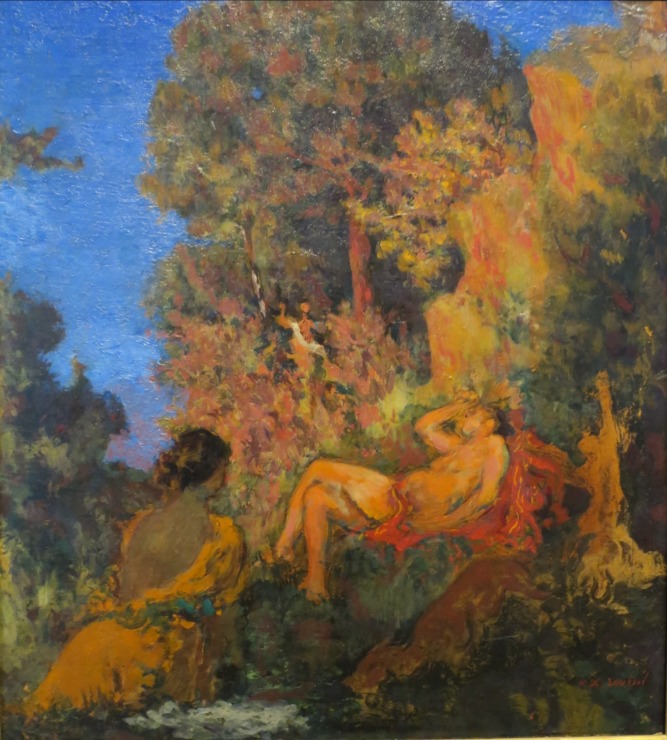< Return to Edgar Allan Poe Poems
The Sleeper
At midnight, in the month of June,
I stand beneath the mystic moon.
An opiate vapor, dewy, dim,
Exhales from out her golden rim,
And, softly dripping, drop by drop,
Upon the quiet mountain top,
Steals drowsily and musically
Into the universal valley.
The rosemary nods upon the grave;
The lily lolls upon the wave;
Wrapping the fog about its breast,
The ruin moulders into rest;
Looking like Lethe, see! the lake
A conscious slumber seems to take,
And would not, for the world, awake.
All Beauty sleeps!—and lo! where lies
(Her casement open to the skies)
Irene, with her Destinies!
Oh, lady bright! can it be right—
This window open to the night!
The wanton airs, from the tree-top,
Laughingly through the lattice-drop—
The bodiless airs, a wizard rout,
Flit through thy chamber in and out,
And wave the curtain canopy
So fitfully—so fearfully—
Above the closed and fringed lid
‘Neath which thy slumb’ring soul lies hid,
That, o’er the floor and down the wall,
Like ghosts the shadows rise and fall!
Oh, lady dear, hast thou no fear?
Why and what art thou dreaming here?
Sure thou art come o’er far-off seas,
A wonder to these garden trees!
Strange is thy pallor! strange thy dress!
Strange, above all, thy length of tress,
And this all-solemn silentness!
The lady sleeps! Oh, may her sleep
Which is enduring, so be deep!
Heaven have her in its sacred keep!
This chamber changed for one more holy,
This bed for one more melancholy,
I pray to God that she may lie
For ever with unopened eye,
While the dim sheeted ghosts go by!
My love, she sleeps! Oh, may her sleep,
As it is lasting, so be deep;
Soft may the worms about her creep!
Far in the forest, dim and old,
For her may some tall vault unfold—
Some vault that oft hath flung its black
And winged panels fluttering back,
Triumphant, o’er the crested palls,
Of her grand family funerals—
Some sepulchre, remote, alone,
Against whose portal she hath thrown,
In childhood many an idle stone—
Some tomb from out whose sounding door
She ne’er shall force an echo more,
Thrilling to think, poor child of sin!
It was the dead who groaned within.
—Edgar Allan Poe
Enjoy Artistic Representations of “The Sleeper” by Edgar Allan Poe

1900 illustration for “The Sleeper”.

Another 1900 illustration for the poem.

“The Sleeping Diana” by Ker-Xavier Roussel, ca. 1924.
Listen to Readings of “The Sleeper”
Listen to Musical Interpretations of “The Sleeper” by Edgar Allan Poe
That’s it for readings of The Sleeper by Edgar Allan Poe!
About Edgar Allan Poe
Edgar Allan Poe (1809-1849) published his first collection of poems, Tamarlane, and Other Poems, in 1827, when he was 18 years old. A tendency to run up debts (including for gambling) kept him in constant state of reinvention – college student, poet, short story writer, soldier/officer school, literary journal editor and critic.
The Poe who arises from Symons’ hand (his biographer in The Telltale Heart: The Life and Works of Edgar Allan Poe) is a man who first and foremost was determined to put Southern letters on the map, aiming to wrest control from the literary establishment in New York and New England (Poe aimed some rather pointed arrows at writers like Henry Wadsworth Longfellow). For his own writing, he wanted to be considered a poet. The poems were the important works; the stories were almost after-thoughts, almost dashed off primarily to raise funds. And he always needed money.
His personal life seemed to have stayed a general mess, but he had an enormous impact on both American and world literature. Consider the stories and poems that have been filmed, published, re-published, anthologized, celebrated and widely admired for more than 150 years: “Murders in the Rue Morgue,” “Fall of the House of Usher,” The Raven, “The Tell-Tale Heart,” Annabel Lee, “The Bells,” “Ulalame,” “To Helen.”
We associate Edgar Allan Poe with 19th century gothic. His stories are full of mystery, passion, horror, violence, death, and the supernatural. And yet his poems, especially “The Raven” and “Annabel Lee,” made him famous in pre-Civil War America and established his literary reputation.
Questions and mystery surrounded Poe’s own life and death, and continue even today – we may never know who left three roses and a bottle of cognac on his grave in Baltimore for decades until 2011 (alas, the “Poe Toaster” disappeared or died, to be seen nevermore).
You can read more about Poe’s biography in the articles Poets and Poems: Meeting Edgar Allan Poe and Forgotten Classics, The Telltale Heart by Julian Symons by Glynn Young, from which this biography was compiled.
I hope you enjoyed The Sleeper by Edgar Allan Poe!
BUY ‘HOW TO WRITE A FORM POEM’ NOW!
